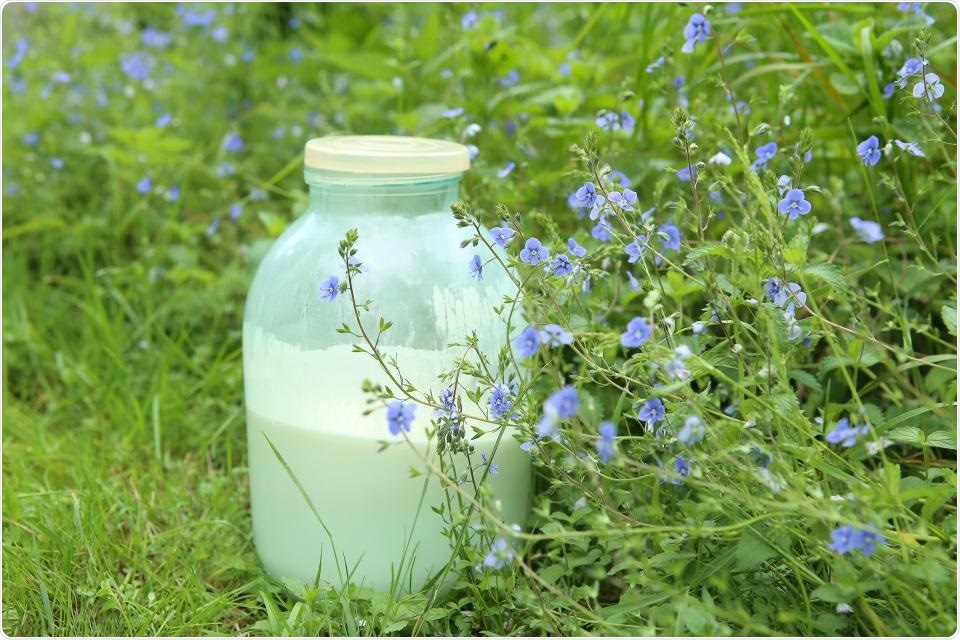According to a new study performed by scientists from the University of California, Davis (UC Davis), unpasteurized or raw cow’s milk sold in U.S. retail stores can harbor a large amount of antimicrobial-resistant genes if stored at room temperature.

UC Davis study finds raw milk left at room temperature harbors antimicrobial-resistant genes. Image Credit: Getty.
The research also discovered that pathogens containing antimicrobial-resistant genes can pass them to other microbes, possibly spreading resistance if ingested. The study results were published in the Microbiome journal.
We don’t want to scare people, we want to educate them. If you want to keep drinking raw milk, keep it in your refrigerator to minimize the risk of it developing bacteria with antibiotic-resistant genes.”
Jinxin Liu, Study Lead Author and Postdoctoral Researcher, Department of Food Science and Technology, University of California, Davis
Lacking in probiotics
On the whole, 3% of the U.S. population is estimated to consume raw, or unpasteurized, milk which has not been heated to destroy microbes and prolong shelf life.
Raw milk is usually advertised to consumers as having a large supply of healthy bacteria or probiotics when compared to pasteurized milk. However, the UC Davis team found that it is far from true.
Two things surprised us. We didn’t find large quantities of beneficial bacteria in the raw milk samples, and if you leave raw milk at room temperature, it creates dramatically more antimicrobial-resistant genes than pasteurized milk.”
Jinxin Liu, Study Lead Author and Postdoctoral Researcher, Department of Food Science and Technology, University of California Davis
Bacteria that have antimicrobial-resistant genes, if transferred to a microbe, have the ability to become “superbugs,” which means pharmaceuticals used for treating a disease or infection do not work anymore. According to the Centers for Disease Control, around three million people acquire an antibiotic-resistant infection and over 35,000 people die every year.
The longer it sits, the worse it gets
As such, UC Davis scientists examined over 2,000 retail milk samples from a total of five states, including pasteurized milk and raw milk, in various ways. The researchers identified that raw milk had a maximum prevalence of antibiotic-resistant bacteria when stored at room temperature.
Our study shows that with any temperature abuse in raw milk, whether intentional or not, it can grow these bacteria with antimicrobial resistance genes. It’s not just going to spoil. It’s really high risk if not handled correctly.”
Michele Jay-Russell, Study Co-Author and Research Microbiologist, Western Center for Food Safety, University of California, Davis
Jay-Russell is also a manager at Western Center for Food Safety in UC Davis.
There are some consumers who deliberately keep the raw milk outside the refrigerator at room temperature to ferment it so that it turns into the so-called clabber. According to David Mills, Peter J. Shields Chair of Dairy Food Science, if consumers intake raw milk clabber, they are probably adding a large number of antimicrobial-resistant genes to their gut.
David Mills stated, “You could just be flooding your gastrointestinal tract with these genes. We don’t live in an antibiotic-free world anymore. These genes are everywhere, and we need to do everything we can to stop that flow into our bodies.”
Additional studies are required to completely understand whether antibiotic-resistant genes present in raw milk change into health risks for human beings, but Mills implied that if consumers want to ferment raw milk, they should try using a starter culture, which carries certain strains of pathogens to inoculate the milk.
Source:
Journal reference:
Liu, J., et al. (2020) Reservoirs of antimicrobial resistance genes in retail raw milk. Microbiome. doi.org/10.1186/s40168-020-00861-6.